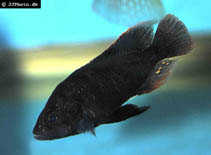| Family: |
Cichlidae (Cichlids), subfamily: Pseudocrenilabrinae |
| Max. size: |
10.67 cm SL (male/unsexed) |
| Environment: |
demersal; freshwater |
| Distribution: |
Africa: endemic to the Mwanza Gulf in southern Lake Victoria, Tanzania. |
| Diagnosis: |
Dorsal spines (total): 15-16; Dorsal soft rays (total): 9-10; Anal spines: 3-3; Anal soft rays: 9-10; Vertebrae: 29-31 |
| Biology: |
Found in rocky substrates. Restricted to places with large, very steeply sloping boulders, where it inhabits the immediately inshore slope between 0.5 and at least 5 m water depth and lives in crevices between boulders, including rock pools within emerged rocky reefs. Stomach content analyses of males showed a seasonally variable diet of insect larvae, filamentous Cyanophyta, Bryozoa, prawns, detritus and juvenile fish (Ref. 27668). |
| IUCN Red List Status: |
Vulnerable (VU); Date assessed: 01 April 2010 (D2) Ref. (130435)
|
| Threat to humans: |
harmless |
Source and more info: www.fishbase.org. For personal, classroom, and other internal use only. Not for publication.

